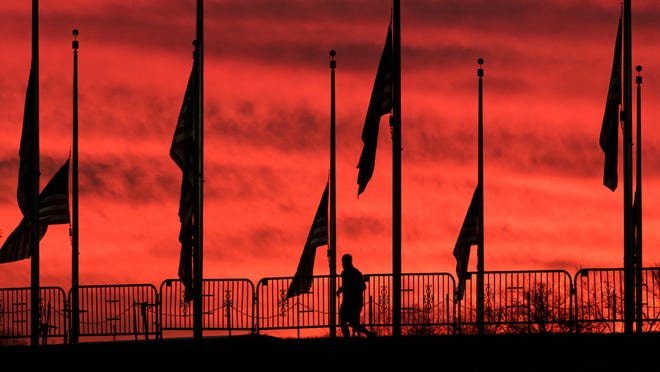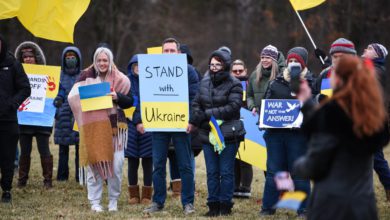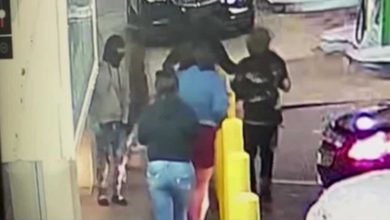
As he highlighted his administration’s progress in the massive vaccination campaign against the coronavirus Thursday, President Joe Biden made a plea for Americans not to let their guard down despite a dwindling number of infections and hospitalizations in recent weeks.
“This is not a time to relax,’’ Biden said as he warned about the possible impact of virus variants. “We must keep washing our hands, stay socially distanced, and for God’s sake – for God’s sake – wear a mask.’’
Biden made the comments as part of a ceremony to mark 50 million vaccine doses being administered since he took office Jan. 20. He had promised 100 million shots in his first 100 days – a goal critics later decried as not ambitious enough – and the halfway point was reached on his 37th day.
The president said vaccine distribution to states has increased by 70% since his inauguration – from 8.6 million doses a week when President Donald Trump left to 14.5 million now – and that nearly 60% of people over age 75 have received at least one shot. The same goes for close to 50% of those over 65, he said.
In addition, Biden said 75% of residents of long-term facilities – vulnerable populations who account for 30% of the 507,000 COVID-19 deaths in the U.S. – have gotten at least one vaccine dose, a major factor in the drastic reduction in their fatality rate over the last two months.
The vaccination program will get a major boost if the Food and Drug Administration gives the new, single-dose Johnson & Johnson vaccine an emergency use authorization, as is expected in the coming days.
An advisory committee of the FDA will decide Friday whether to recommend authorization, and Biden sought to reassure the public there would be no outside interference.
“We’re going to do this the right way,’’ he said. “The FDA will decide on emergency use authorization of a vaccine based on science, not due to any political pressure from me or anyone else.’’
Also in the news:
►Gov. Kate Brown on Thursday extended Oregon’s declaration of a state of emergency until May 2 as confirmed COVID-19 cases continue to drop across the state but still number in the hundreds each day.
►The Food and Drug Administration will allow Pfizer’s COVID-19 vaccine to be shipped and stored at freezers commonly found in pharmacies rather than the ultra-frigid ones initially required after data from the company showed the vaccine remains stable for up to two weeks in standard freezer temperatures. Thursday's decision will make it easier to distribute and administer the vaccine.
►Three days after the U.S. became the first country to lose 500,000 lives to the coronavirus, the worldwide total of COVID-19 deaths reached 2.5 million Thursday. The U.S. accounts for more than 20% of the global death toll, and more than 150,000 Americans have been killed by the disease already this year.
►Country music star Trisha Yearwood is "under the greatest care" at home after contracting the virus, her husband, Garth Brooks, said in a statement. The press release says Yearwood is dealing with unspecified symptoms but "doing OK so far." Brooks said he tested negative.
? Today's numbers: The U.S. has more than 28.4 million confirmed coronavirus cases and 508,100 deaths, according to Johns Hopkins University data. The global totals: More than 112.9 million cases and 2.5 million deaths. More than 91.6 million vaccine doses have been distributed in the U.S. and about 68.2 million have been administered, according to the CDC.
? What we're reading: Surgery for a child, paying a loan, electric bills: We asked Americans how they would spend $1,400 stimulus checks. This is what they said.
USA TODAY is tracking COVID-19 news. Keep refreshing this page for the latest updates. Are you on Clubhouse? If so, tune in to our live discussion on COVID-19 at 7 p.m. EST Thursday.
South Korea, Hong Kong administer first doses of COVID-19 vaccines
South Korea administered its first available shots of coronavirus vaccines to people at long-term care facilities Friday, launching a mass immunization campaign that health authorities hope will restore some level of normalcy by the end of the year.
Health authorities plan to complete injecting the first of two doses to some 344,000 residents and workers at long-term care settings and 55,000 frontline medical workers by the end of March.
Also Friday, Hong Kong began administering its first COVID-19 vaccines to the public, kicking off its program offering free vaccinations to all 7.5 million residents.
Dr. Anthony Fauci warns against cherry-picking vaccines
Americans should not try to pick and choose which vaccine they get but should take the first one available, Dr. Anthony Fauci said Thursday.
Fauci, a top U.S. infectious disease expert, warned people not to hold off on getting the Johnson & Johnson vaccine if it soon becomes available while waiting for the slightly more effective Pfizer or Moderna shots. Fauci also told NBC News a third vaccine becoming available “is nothing but good news.”
Johnson & Johnson’s single-dose vaccine offers strong protection against severe COVID-19. It’s expected to be authorized soon by the FDA.
Fauci said it’s a race “between the virus and getting vaccines into people” – and the longer people wait, "the better chance the virus has to get a variant or a mutation.”
Pfizer to begin testing booster shot targeting variants
Pfizer-BioNTech will begin testing a booster shot to combat COVID-19 variants, the companies announced Thursday. The announcement came one day after new research published in the New England Journal of Medicine confirmed that two doses of the Pfizer-BioNTech vaccine cut symptomatic COVID-19 cases across all age groups by 94%.
Now the two-company collaboration has asked 144 volunteers who participated in the earliest phase of its clinical vaccine trials last year to volunteer again to receive the booster, a third shot of the same vaccine designed to see whether it will help them fight off new, more infectious variants that have been circulating in recent months. It’s not yet clear whether a new vaccine or booster will be needed to address the known variants, but companies want to be prepared if studies show a new vaccine is needed.
“While we have not seen any evidence that the circulating variants result in a loss of protection provided by our vaccine, we are taking multiple steps to act decisively and be ready in case a strain becomes resistant to the protection afforded by the vaccine," Albert Bourla, Pfizer's chairman and CEO, said in a statement.
– Karen Weintraub
Some GOP mayors warm to Biden stimulus package
As President Joe Biden's $1.9 billion relief package heads for a vote Friday in the Democrat-controlled House, cash-strained city halls are some of the legislation's biggest boosters. The bill could pass with zero support among GOP House members, even though Republican mayors are among those seeking federal assistance to replenish tax revenue shortages. Thirty-two Republicans are among 425 mayors nationally who urged passage of Biden's COVID-19 relief package in a letter through the U.S. Conference of Mayors to Congress.
"The need is real and it's not just in Democratic-core communities," said Bryan Barnett, the Republican mayor of Rochester Hills, Mich..
– Joey Garrison
They're back: Schools will be administering standardized tests again
When the world of K-12 education spiraled into confusion last spring, many teachers and students quietly delighted in the disappearance of high-stakes achievement tests. The Department of Education dropped the requirement for states to administer annual achievement exams in reading and math, which usually happens in spring. Schools pivoted to connecting with students digitally.
But now those tests are coming back. President Joe Biden’s administration this week decided against another blanket waiver on federally mandated achievement exams this year, saying instead states can delay or shorten the tests or give them virtually – or skip testing remote learners.
"We know that schools and districts have approached (schooling in the pandemic) with different levels of competence and technology," said Ethan Hutt, an education professor at the University of North Carolina at Chapel Hill. "If we want to direct policy and resources to schools that are particularly hard hit, we need more precise information about what's happening."
– Erin Richards and Alia Wong
Want the COVID vaccine? For many people of color, it's a trust issue
Less than 14% of the U.S. population has received the vaccine, and preliminary data suggests people of color are being vaccinated at lower rates than white Americans.
Chelsea White, executive director of the Dallas Bethlehem Center, said historically the community has not trusted the government or outside groups, particularly when it comes to health care.
“COVID is bad enough for anyone, but when you have this kind of crisis in this neighborhood, it’s just catastrophic and it will affect this neighborhood for years,” White said. “They’ll overpromise, underdeliver and then leave." Read more here.
Contributing: The Associated Press
Source link










